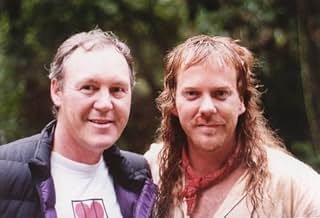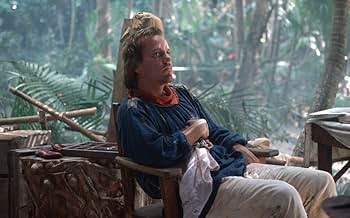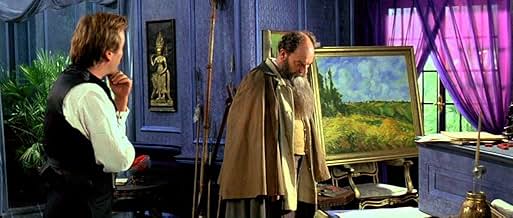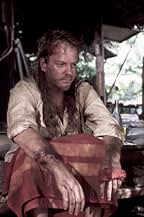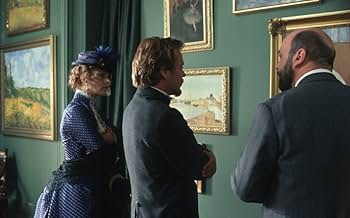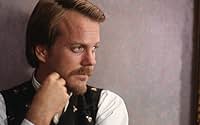Aggiungi una trama nella tua linguaA successful 19th century French stockbroker (Sutherland) leaves his profession to become an artist in Paris.A successful 19th century French stockbroker (Sutherland) leaves his profession to become an artist in Paris.A successful 19th century French stockbroker (Sutherland) leaves his profession to become an artist in Paris.
- Regia
- Sceneggiatura
- Star
Jana Bittnerová
- Suzanne
- (as Jana Bittnerova)
Recensioni in evidenza
Paradise Found (2003)
Paul Gauguin is a great artist, and his work is daring and beautiful. So whenever the movie lets the work show through--and it does several times--it rises to its best. And the man playing the artist, improbable as it is, is Kiefer Sutherland, who does a decent job. It's hard to say to what extent he is true to the real man--how can anyone know?--but he combines intensity and craziness in good measure.
And, to keep on the good notes, it's actually not so bad how German-born Nastassjia Kinski handles the Danish wife of Gauguin, Mette-Sophie. Several other characters make brief appearances, the one most famous is Pissarro played by Alun Armstrong, who I didn't know, but who is strong enough at making the Impressionist slightly out of touch with the changing tides of art. In fact, what the movie does accomplish is show some sense of the art scene in Paris from Gauguin's point of view, and Gauguin's friendship with Pissarro as a catalyst to his becoming a serious artist.
The story is told in interspersed flashbacks, which are distracting and almost arbitrary. It begins with Gauguin's arrival in Tahiti, then jumps back 17 years to Paris, then to Tahiti, back and forth uncountable times. And without reason, except to chop the movie up, as if a chronological telling would be dull.
More troubling is the depiction of Tahiti (and other islands in French Polynesia). It plays loose with facts. Historically, the islands were largely ruined and in disease from the colonists, not the idyllic paradise shown here, infested with a handful of soldiers and an excessively zealous Christian missionary. The struggle of the islanders to preserve their religious icons is overemphasized, and the struggle of Gauguin to land women and young girls for sex is underemphasized. He's passionate and troubled, broke and dirty. That is, he's an artist, through and through.
So it gets a bit tiring. And in fact, between all the little eruptions of energy and conflicting emotions, very little happens, really happens. And it's filmed plainly, to the point of being dull, cutting from person to person in conversation as if by formula. The sets are well done and sometimes quite beautiful, and they should have inspired a more intense visual approach. As the paintings themselves should have, too.
Paul Gauguin is a great artist, and his work is daring and beautiful. So whenever the movie lets the work show through--and it does several times--it rises to its best. And the man playing the artist, improbable as it is, is Kiefer Sutherland, who does a decent job. It's hard to say to what extent he is true to the real man--how can anyone know?--but he combines intensity and craziness in good measure.
And, to keep on the good notes, it's actually not so bad how German-born Nastassjia Kinski handles the Danish wife of Gauguin, Mette-Sophie. Several other characters make brief appearances, the one most famous is Pissarro played by Alun Armstrong, who I didn't know, but who is strong enough at making the Impressionist slightly out of touch with the changing tides of art. In fact, what the movie does accomplish is show some sense of the art scene in Paris from Gauguin's point of view, and Gauguin's friendship with Pissarro as a catalyst to his becoming a serious artist.
The story is told in interspersed flashbacks, which are distracting and almost arbitrary. It begins with Gauguin's arrival in Tahiti, then jumps back 17 years to Paris, then to Tahiti, back and forth uncountable times. And without reason, except to chop the movie up, as if a chronological telling would be dull.
More troubling is the depiction of Tahiti (and other islands in French Polynesia). It plays loose with facts. Historically, the islands were largely ruined and in disease from the colonists, not the idyllic paradise shown here, infested with a handful of soldiers and an excessively zealous Christian missionary. The struggle of the islanders to preserve their religious icons is overemphasized, and the struggle of Gauguin to land women and young girls for sex is underemphasized. He's passionate and troubled, broke and dirty. That is, he's an artist, through and through.
So it gets a bit tiring. And in fact, between all the little eruptions of energy and conflicting emotions, very little happens, really happens. And it's filmed plainly, to the point of being dull, cutting from person to person in conversation as if by formula. The sets are well done and sometimes quite beautiful, and they should have inspired a more intense visual approach. As the paintings themselves should have, too.
The Post-Impressionist painter Paul Gauguin was famously portrayed by Anthony Quinn in the Van Gogh biopic "Lust for Life" in the fifties, a performance which won Quinn a "Best Supporting Actor" Oscar, even though his character is only on stage for eight minutes. In "Paradise Found" it is Gauguin's turn to take centre stage. This is not a complete biography of the painter- Van Gogh, for example, is never mentioned- but concentrates on two periods in his life.
In 1880 Gaugin is working as a stockbroker in Paris. His job pays well and he has become a fully paid-up member of the French haute bourgeoisie. He is also an amateur painter and an enthusiastic art collector. A chance meeting with the older artist Camille Pissarro, who later becomes a close friend, persuades him that his vocation is to paint full-time and he resigns from his job, much to the dismay of his Danish-born wife Mette.
Intercut with the scenes showing the beginning of Gauguin's artistic career are others set during a later part of his life. He is now separated from Mette and his family and living in Tahiti where he has gone to seek inspiration. He befriends the local inhabitants, whose way of life he admires, and clashes with the local missionaries and the French colonial authorities who he believes are threatening to destroy traditional Tahitian culture in their zeal to bring Christianity to the island. The film's title, an obvious play on that of Milton's "Paradise Lost", therefore has an ironic meaning. Gauguin believes that he has found Paradise in Tahiti, but it is a Paradise in danger of being "lost" again, and that danger, ironically, comes from the Christian religion of which Milton was so ardent an advocate.
Gauguin is played by Kiefer Sutherland whose father, Donald, also once played the artist, in the 1986 film "The Wolf at the Door", which I must admit I have never seen. Now there is nothing really wrong with Kiefer's performance here, but it does not really catch fire. The best of the cast is probably Alun Armstrong as Pissarro. Nastassja Kinski never really looks convincing as Mette, largely because of that blonde wig. (Someone obviously told the director, incorrectly, that there are no brunettes in Denmark).
It is not impossible to make a bad film about the life of a great artist- Derek Jarman managed it with the near-incomprehensible "Caravaggio"- but because so many famous have been passionate, larger-than-life individuals, films about them give great scope for film-makers and actors to produce something memorable. I am thinking not only of Quinn and Kirk Douglas in "Lust for Life" but also of Charles Laughton in "Rembrandt", Charlton Heston as Michelangelo in "The Agony and the Ecstasy", Colin Firth as Vermeer in "The Girl with a Pearl Earring" and Timothy Spall in Mike Leigh's recent "Mr Turner". "Paradise Found" is visually attractive, both in those scenes set in France and those taking place in the South Pacific, and overall it is not a bad film. In fact, it is quite a good one. I just felt that a film dealing with someone like Gauguin could have done better than "quite good". 7/10
In 1880 Gaugin is working as a stockbroker in Paris. His job pays well and he has become a fully paid-up member of the French haute bourgeoisie. He is also an amateur painter and an enthusiastic art collector. A chance meeting with the older artist Camille Pissarro, who later becomes a close friend, persuades him that his vocation is to paint full-time and he resigns from his job, much to the dismay of his Danish-born wife Mette.
Intercut with the scenes showing the beginning of Gauguin's artistic career are others set during a later part of his life. He is now separated from Mette and his family and living in Tahiti where he has gone to seek inspiration. He befriends the local inhabitants, whose way of life he admires, and clashes with the local missionaries and the French colonial authorities who he believes are threatening to destroy traditional Tahitian culture in their zeal to bring Christianity to the island. The film's title, an obvious play on that of Milton's "Paradise Lost", therefore has an ironic meaning. Gauguin believes that he has found Paradise in Tahiti, but it is a Paradise in danger of being "lost" again, and that danger, ironically, comes from the Christian religion of which Milton was so ardent an advocate.
Gauguin is played by Kiefer Sutherland whose father, Donald, also once played the artist, in the 1986 film "The Wolf at the Door", which I must admit I have never seen. Now there is nothing really wrong with Kiefer's performance here, but it does not really catch fire. The best of the cast is probably Alun Armstrong as Pissarro. Nastassja Kinski never really looks convincing as Mette, largely because of that blonde wig. (Someone obviously told the director, incorrectly, that there are no brunettes in Denmark).
It is not impossible to make a bad film about the life of a great artist- Derek Jarman managed it with the near-incomprehensible "Caravaggio"- but because so many famous have been passionate, larger-than-life individuals, films about them give great scope for film-makers and actors to produce something memorable. I am thinking not only of Quinn and Kirk Douglas in "Lust for Life" but also of Charles Laughton in "Rembrandt", Charlton Heston as Michelangelo in "The Agony and the Ecstasy", Colin Firth as Vermeer in "The Girl with a Pearl Earring" and Timothy Spall in Mike Leigh's recent "Mr Turner". "Paradise Found" is visually attractive, both in those scenes set in France and those taking place in the South Pacific, and overall it is not a bad film. In fact, it is quite a good one. I just felt that a film dealing with someone like Gauguin could have done better than "quite good". 7/10
Being the die hard Sutherland fan that I am, I enjoyed this flick purely for his performance. The film is rather superficial and slow-moving, but there is quite a bit of power behind Sutherland's performance, which makes it worth the while of those who just need more of Kiefer. I can't say I'd watch this film again, but I appreciate the emotional investment that the actors put into it. A six out of ten.
This film, as far as I can remember, never had a commercial run here, or at least, this movie probably went to cable right after it's release in other countries. The idea of watching a biopic about Gauguin intrigued me since this painter had a turbulent career and his paintings, especially his Tahitian ones, revolutionized the art world.
As it has been pointed out by other contributors to this forum, Paul Gauguin had a difficult life. He was never clearly understood by his wife, or the general public he tried to conquer. He was a passionate man who left all the comforts in order to pursue an ambition that never gave him the happiness or economic security that others attained.
The screen play, not being linear, doesn't add much to the story. We are constantly taken back and forth, knowing little about the man. Paul Gauguin's family life was an unhappy one. His wife Mette never clearly understood him, nor stuck by him when he abandoned the brokerage house. Mette appears as a cold woman who never shared her husband's passion for the life he embarked.
Kiefer Sutherland's interpretation of the painter can go so far; he is hindered by an uninspired screen play. As far as his struggle with the local priest, who clearly wants to take the natives' culture away from them, is only a distraction. Actually, we see very little about the passion that consumed Gauguin during his time in Tahiti as he spends very little time doing what he went there for, in the first place: painting!
As it has been pointed out by other contributors to this forum, Paul Gauguin had a difficult life. He was never clearly understood by his wife, or the general public he tried to conquer. He was a passionate man who left all the comforts in order to pursue an ambition that never gave him the happiness or economic security that others attained.
The screen play, not being linear, doesn't add much to the story. We are constantly taken back and forth, knowing little about the man. Paul Gauguin's family life was an unhappy one. His wife Mette never clearly understood him, nor stuck by him when he abandoned the brokerage house. Mette appears as a cold woman who never shared her husband's passion for the life he embarked.
Kiefer Sutherland's interpretation of the painter can go so far; he is hindered by an uninspired screen play. As far as his struggle with the local priest, who clearly wants to take the natives' culture away from them, is only a distraction. Actually, we see very little about the passion that consumed Gauguin during his time in Tahiti as he spends very little time doing what he went there for, in the first place: painting!
An absolutely dreadful rendition of Gauguin's life on Tahiti.There is no sense of his passion in a wonderful adventure in the South Seas and the real difficulties he faced.Having studied this painters life in some detail I find this biopiic unbelievably innacurate. We even have his wife Mette loving his paintings from Tahiti, which in reality she despised. There is even a scene of her at his exhibition in Paris, an event she refused to attend.She never appreciated any of his work. If a filmmaker or writer embarks on a biopic picture they need to keep the basic facts correct. The Directing and editing is very slow and not very entertaining. It is difficult to blame the actors with such a pedestrian script but I found the casting quite misguided. Gauguin must be quaking in his grave at this effort at portraying his brave and noble life in pursuit of his art.
Lo sapevi?
- QuizKiefer Sutherland's father, Donald Sutherland, also portrayed the artist Paul Gauguin in the film La vita di Gauguin (1986).
- BlooperPissarro is misspelled "Pissaro" in the closing credits (but spelled correctly in the DVD captions).
- Citazioni
Paul Gauguin: I have some advice of my own: you'd best mind your own fucking business.
- ConnessioniVersion of Il sogno di Tahiti (1980)
I più visti
Accedi per valutare e creare un elenco di titoli salvati per ottenere consigli personalizzati
- How long is Paradise Found?Powered by Alexa
Dettagli
- Data di uscita
- Paesi di origine
- Lingua
- Celebre anche come
- Gauguin: Diario de un genio
- Luoghi delle riprese
- Aziende produttrici
- Vedi altri crediti dell’azienda su IMDbPro
Botteghino
- Budget
- 10.000.000 A$ (previsto)
- Tempo di esecuzione
- 1h 33min(93 min)
- Colore
- Mix di suoni
- Proporzioni
- 2.35 : 1
Contribuisci a questa pagina
Suggerisci una modifica o aggiungi i contenuti mancanti


